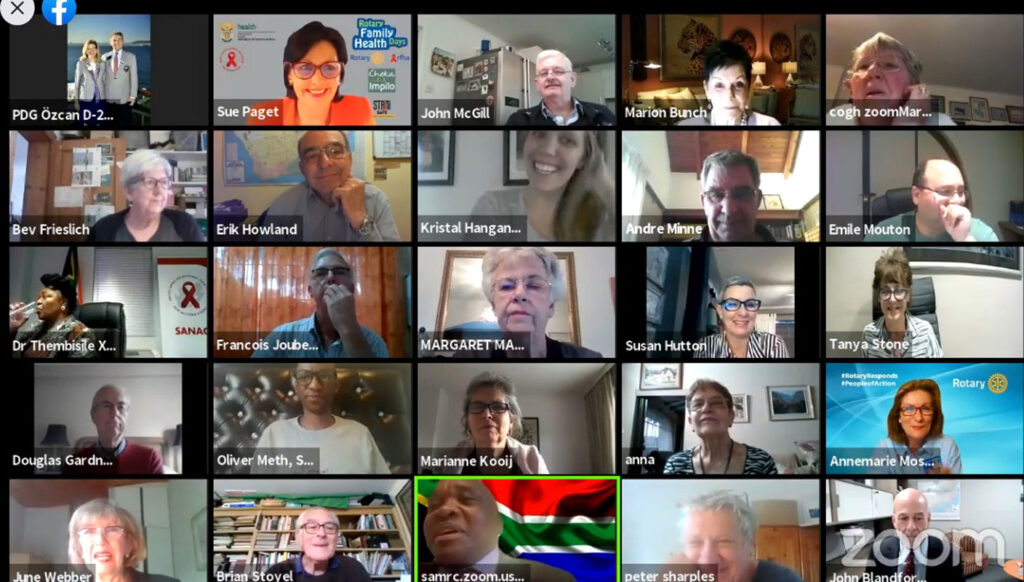In the next two years, Rotary clubs across India have been told to do at least five per cent of their global grant projects outside India and “a major chunk of it will come to Africa,” said RIPE Shekhar Mehta. Speaking at a webinar on Rotary Family Health Days (RFHD) hosted by the Rotarians for Family Health and AIDS Prevention (RFHA), South Africa, in partnership with the South African government, he said after he takes charge as RI president next year, “at least 10 per cent of GG projects will be done outside the country.”

Rotary is ready to play a bigger role in South Africa along with its government, NGOs and corporates, Mehta said and underlined the excellent partnership RFHA has forged with the health department over the years. “Unfortunately, this year, we will not be able to hold RFHD events as we are struggling with the greatest health issue that has afflicted mankind. Covid has brought the world down to its knees and we really don’t know how long this will continue. While many of our health programmes are disrupted, it is time for us to rethink our strategies and sharpen our axes,” he said.
RFHD is a signature programme of the RFHA being carried out in nine countries in Africa during October each year in which three-day free health camps are held to screen people for a host of preventable diseases, HIV/AIDS and vaccinate children against viruses and infections. Since 2011, over 2.5 million people have benefitted from around 11 million free health camps offered through a public-private partnership model by RFHA.
Complimenting RFHA founder Marion Bunch and its present CEO Sue Paget for taking the programme from strength to strength, he said Rotary is not only committed to end polio, it will also deal with Covid, tackle HIV/AIDS and other health issues.
A corporate legacy
Polio eradication has been the corporate programme of Rotary over the last 35 years. From 350,000 cases a year in 125 countries then, to 150 children afflicted with polio in two countries so far this year, “Rotary has saved more than five million children either from death or being crippled.” Africa being declared polio-free with Nigeria getting certified by the WHO this September is a major milestone. Polio is only the second vaccine preventable disease to be almost eradicated from the world, and Rotary can take justifiable pride in this work, said Mehta.
The Indian government takes Rotary seriously given its polio legacy and many successful projects being done in literacy, water and sanitation across the districts. “Around 100 million children are learning through the e-curriculum designed by Rotary and beamed on 12 TV channels during the lockdown. And this will scale up to 250 million children after normalcy,” he pointed out. This mission would not have been possible, but for the partnership with GoI. In literacy, Rotary India’s target is to make India over 95 per cent literate compared to the current 76 per cent.
Mission Africa
Mehta called upon Rotary clubs in Africa to increase their membership as “there is a great potential for growth in this region. We are an excellent organisation with tremendous reach, network, outstanding legacy, and passionate Rotarians with unmatched focus as shown in their commitment to end polio over the last 35 years.” RFHA is doing meaningful work in Africa which can be replicated in others parts of the world including South Asia, he said.
RFHD was conducted in India for two years; it can be revived now and taken to Nepal, Pakistan, Bangladesh and Sri Lanka in a gradual manner. RI has sanctioned $20 million as global grants for Covid projects around the world, besides one time disaster response fund ($25,000), he said, and noted Indian Rotarians have done projects worth $30 million for setting up Covid centres, donating equipment, PPE kits, masks and sanitisers at the grassroots level. “There is no disease we cannot overcome and no problem that we cannot take head on,” he added.
Addressing the RFHD webinar, South African Health Minister Dr Zwelini Mkhize said this health initiative by Rotary “achieves the goals of primary healthcare through an enabling environment for communities to proactively seek health care and be afforded the opportunity to practise preventative healthcare.”
The timeliness of this year’s programme could not be more critical, he noted, as “we emerge out of the Covid surge and refocus our energy on universal health coverage.” Health experts and Rotarians, including Centers for Disease Control and Prevention country director Dr John Blanford, Global Rotary CEO Dr Ian Burton, Action Group for Family Health and AIDS Prevention CEO Sue Paget and government officials, including Deputy Health Minister Dr Joe Phaahla, spoke at the webinar.






